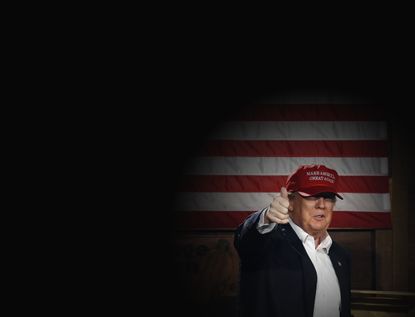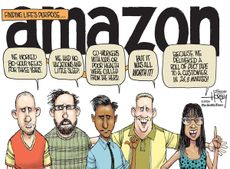Donald Trump's disruption of the Fox News debate is a political masterstroke
Trump again shows why he's the master of instant politics


Donald Trump's decision to withdraw from Thursday's Fox News Channel debate was treated like a bombshell, a surprise move from a candidate who has patented the mid-week swerve. But it was entirely predictable.
Trump draws attention for two reasons. The content of his pronouncements are often out of bounds, violations of the staid conventions of American political discourse. But the way he makes them — the medium — is just as important. "He is a constant disrupter of narrative," said Nicco Mele, a Los Angeles-based content strategist and entrepreneur.
Today, Mele notes, campaigns derive momentum from the passions around a moment in time as much as they do from narratives. This fits nicely with the way we consume media today. It rejects the longer, slower thinking associated with a traditional narrative, a narrative of the way a race is supposed to go, or the story a person is supposed to represent. Trump is a man of moments and instant gratification. If the pronouncements don't connect together to form a coherent whole, so what? Voters, at least for now, seem to eat it up.
Subscribe to The Week
Escape your echo chamber. Get the facts behind the news, plus analysis from multiple perspectives.

Sign up for The Week's Free Newsletters
From our morning news briefing to a weekly Good News Newsletter, get the best of The Week delivered directly to your inbox.
From our morning news briefing to a weekly Good News Newsletter, get the best of The Week delivered directly to your inbox.
"By announcing that he will not debate, Trump likely will dominate news coverage and deny Ted Cruz and other opponents a face-to-face confrontation before Iowa Republicans go to caucus," noted The Washington Post.
Whether Trump's gamble is disastrous or brilliant, NBC News noted, "it essentially freezes a race that he's leading." Exactly. Trump's bombshells reflect a mastery of the way we process politics, which Douglas Rushkoff, a keen observer of technology, calls "present shock."
"Our ability to create a plan — much less follow through on it — is undermined by our need to be able to improvise our way through any number of external impacts that stand to derail at any moment," he writes.
Our present, mediated by the Internet, is a haze of conflicting claims, narratives, and demands on our time and attention. Trump has figured out — or just intuitively gets — that to control this race, he has to keep our attention constantly. He cuts through the haze.
Connect that to his basic message — I will bring us out of this weird, aggrieved present — and Trump has all the narrative he needs.
Trump's opponents hope that voters will move away from the present when they move into the privacy of the ballot booth. Their perspective turns prospective. They'll be thinking, again, in narratives. That might give the candidates with an established story an advantage. But we shall see.
Create an account with the same email registered to your subscription to unlock access.
Sign up for Today's Best Articles in your inbox
A free daily email with the biggest news stories of the day – and the best features from TheWeek.com
Marc Ambinder is TheWeek.com's editor-at-large. He is the author, with D.B. Grady, of The Command and Deep State: Inside the Government Secrecy Industry. Marc is also a contributing editor for The Atlantic and GQ. Formerly, he served as White House correspondent for National Journal, chief political consultant for CBS News, and politics editor at The Atlantic. Marc is a 2001 graduate of Harvard. He is married to Michael Park, a corporate strategy consultant, and lives in Los Angeles.
-
 'Republicans want to silence Israel's opponents'
'Republicans want to silence Israel's opponents'Instant Opinion Opinion, comment and editorials of the day
By Harold Maass, The Week US Published
-
 Poland, Germany nab alleged anti-Ukraine spies
Poland, Germany nab alleged anti-Ukraine spiesSpeed Read A man was arrested over a supposed Russian plot to kill Ukrainian President Zelenskyy
By Peter Weber, The Week US Published
-
 Today's political cartoons - April 19, 2024
Today's political cartoons - April 19, 2024Cartoons Friday's cartoons - priority delivery, USPS on fire, and more
By The Week US Published
-
 Arizona court reinstates 1864 abortion ban
Arizona court reinstates 1864 abortion banSpeed Read The law makes all abortions illegal in the state except to save the mother's life
By Rafi Schwartz, The Week US Published
-
 Trump, billions richer, is selling Bibles
Trump, billions richer, is selling BiblesSpeed Read The former president is hawking a $60 "God Bless the USA Bible"
By Peter Weber, The Week US Published
-
 The debate about Biden's age and mental fitness
The debate about Biden's age and mental fitnessIn Depth Some critics argue Biden is too old to run again. Does the argument have merit?
By Grayson Quay Published
-
 How would a second Trump presidency affect Britain?
How would a second Trump presidency affect Britain?Today's Big Question Re-election of Republican frontrunner could threaten UK security, warns former head of secret service
By Harriet Marsden, The Week UK Published
-
 'Rwanda plan is less a deterrent and more a bluff'
'Rwanda plan is less a deterrent and more a bluff'Instant Opinion Opinion, comment and editorials of the day
By The Week UK Published
-
 Henry Kissinger dies aged 100: a complicated legacy?
Henry Kissinger dies aged 100: a complicated legacy?Talking Point Top US diplomat and Nobel Peace Prize winner remembered as both foreign policy genius and war criminal
By Harriet Marsden, The Week UK Last updated
-
 Trump’s rhetoric: a shift to 'straight-up Nazi talk'
Trump’s rhetoric: a shift to 'straight-up Nazi talk'Why everyone's talking about Would-be president's sinister language is backed by an incendiary policy agenda, say commentators
By The Week UK Published
-
 More covfefe: is the world ready for a second Donald Trump presidency?
More covfefe: is the world ready for a second Donald Trump presidency?Today's Big Question Republican's re-election would be a 'nightmare' scenario for Europe, Ukraine and the West
By Sorcha Bradley, The Week UK Published